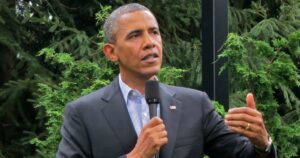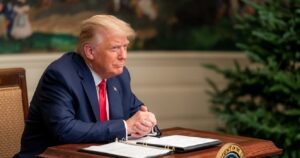Arizona Election Inquiry: AG Probes Alleged Cheney Threat Hoax
Arizona's top legal officer, Kris Mayes, has launched an investigation that scrutinizes claims against former President Donald Trump for allegedly threatening Liz Cheney.
Attorney General Kris Mayes, representing Arizona, recently began a probe into accusations that Donald Trump issued threats toward former U.S. Representative Liz Cheney. The focus of the investigation centers on remarks Trump purportedly made, which critics claim might constitute a death threat under state law.
The incident in question took place during a speech in Glendale, where Trump commented on Cheney’s advocacy for military interventions overseas. He dramatically suggested Cheney might feel differently about her position if she were directly endangered.
Controversial Comments Spark Legal Scrutiny
In detailing the situation, Mayes referenced Trump’s speech on the "Sunday Square Off" show. She indicated the necessity of examining whether his words might be considered a death threat, emphasizing the importance of maintaining peace at polling places ahead of upcoming elections.
Trump responded on Truth Social, asserting that his comments were metaphorical critiques of Cheney's foreign policy stances and not an actual physical threat. He framed his remarks as a figurative scenario to highlight Cheney's hawkish views.
The inquiry has garnered significant attention, drawing criticisms of election interference and misuse of investigative authority by political commentators and observers.
Critics Decry Investigation as Politically Motivated
Political analyst Mark Hemingway labeled the investigation a "total abuse of office and election interference." He argued that the AG’s actions represent a politically charged maneuver rather than a legitimate legal concern.
Journalist Jerry Dunleavy IV echoed this sentiment, describing the situation as "the perfect illustration of the intersection of media disinfo, political opportunism, & abuse of investigative power, all in service of election influence."
The backlash reflects a broader discourse concerning the boundaries of political rhetoric and the implications of legal actions against such statements, particularly in the context of election seasons.
Vice President Weighs in on the Controversy
Vice President Kamala Harris publicly addressed the controversy, criticizing Trump's rhetoric. She praised Liz Cheney as a "true patriot," highlighting her dedication to public service despite their political differences.
Harris’s remarks came amidst a climate of heightened sensitivity to political violence and rhetoric that could incite conflict, setting the stage for national debate over freedom of speech and the responsibilities of public figures.
The Vice President's condemnation seeks to underscore the seriousness of the allegations and the potential impact on political discourse and safety.
Exploring the Legal Boundaries of Political Speech
The unfolding investigation by AG Mayes will explore the legal ramifications of Trump’s statements, considering whether they cross the line into criminal territory under Arizona law.
Mayes has not yet concluded whether Trump’s remarks legally constitute a threat but expressed her commitment to ensuring a safe and peaceful electoral process in the state.
As the investigation progresses, it will likely ignite further debate over what constitutes acceptable political speech and the role of legal systems in moderating such disputes.
National Implications of a Local Investigation
This case may have broader implications for how threats and political rhetoric are handled nationwide, particularly as the U.S. approaches more heated election cycles.
The outcome could set precedents for how similar cases are approached by legal authorities across the country, potentially influencing how political figures communicate in public forums.
As this investigation continues, it will be closely watched by legal experts, politicians, and the public alike, all eager to see how justice will be interpreted and applied in this contentious and high-profile instance.




